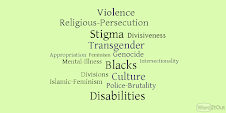Everyone,
Thank you for such a fun and engaging seminar. The energy was great, the comments were insightful, and it was great (and very entertaining) to moderate the fierce debate. I hope that it was a learning experience to see, even on a small fictitious scale, how the worlds of non-profits and alternative to incarcerations function, especially when it comes to funding.
So to recap, we saw that when pitted against each other, to programs that have similar goals (reducing or combatting violence) and want to essentially help people can get hostile very quickly. The way philanthropy has been set up has created a world where organizations, advocates, and non-profits have to fight for limited resources, most of the time in a very formal respectful manner but nonetheless as competitors. However, as we saw today (and not to say that how class was run is how funding is determined), groups can be quick to antagonize other groups, come up with negative press, or fight tooth and nail for money. The stakes are high, with the lives of the community, the victim, the offender, and let us not forget the donors of the funds and the politicians, up in the air. In our class, we saw how even collaboration may be difficult, especially after the critiques of each project.
Something that was brought up during the debates by Minerva and Sylvie, which was not discussed in length during the debate, was the concept of misinterpretation. Both ceasefire and common justice have components that tried to respect and work with identification. For Ceasefire, it was by respecting masculinity and gang culture. In Common Justice, it was about addressing how offenders, or the responsible party, may also be victims of violence and starting a conversation about context. Both try to respect the interpretation of identity, be it masculinity, or what it means to be a victim, which is integral to the success of each program. However, this also leads room for
misinterpretation. Imagine someone coming in and telling you how you should identify yourself, or using what they believe your identity to be as a way to interact with you. Who is to say that the interpretation is correct? And what if it isn't correct? Can it be harmful?
Imagine for a moment if there was a program founded on the premise that it wanted to help Grendel, simply because he was a monster and he needed help fitting in. As we have discussed in class, Grendel was not necessarily a monster. He had a mother, experienced fear, and was very human at times, more human that the humans themselves (which is up for debate). So, isn't the program that is trying to help Grendel doing some harm in already labeling him with an identity that he himself did not agree to? Furthermore, who has the authority to give him an identity anyways?
The question is - how can using what we think we know about masculinity or victims harm the people that both Ceasefire and Common Justice are trying to help? What does this mean on an individual level, on a organizational level, and also for society? And to make this more relatable, how have we been effected by instances where the use of our identification has harmed us. For example, me being a Latino may sometimes bring with it assumptions that may hurt me - such as me being an undocumented immigrant, poor, having already fathered a child, etc. The list of stereotypes can go on. The same goes for the implication of calling someone masculine or a victim. What if they don't identify as such, or disagree? Thought on how these labels and identifications can harm instead of help.
Again, thanks for a great class! It was valid and epic.
